AWM41 1032 - [Nurses Narratives] Staff Nurse E S Rogerson
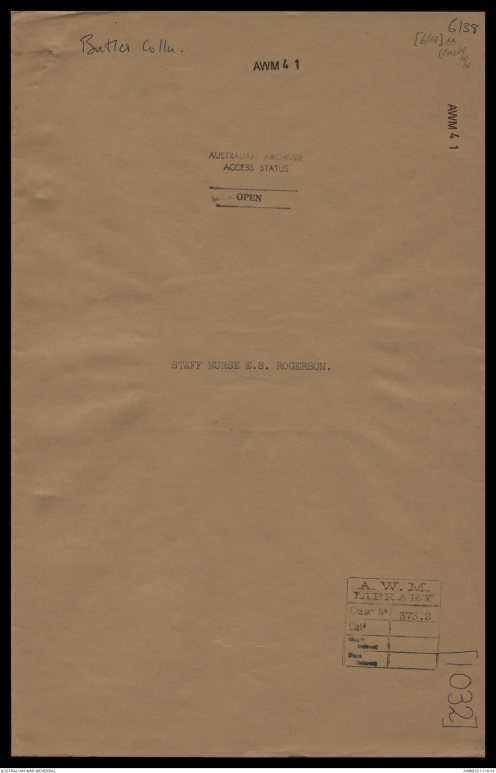
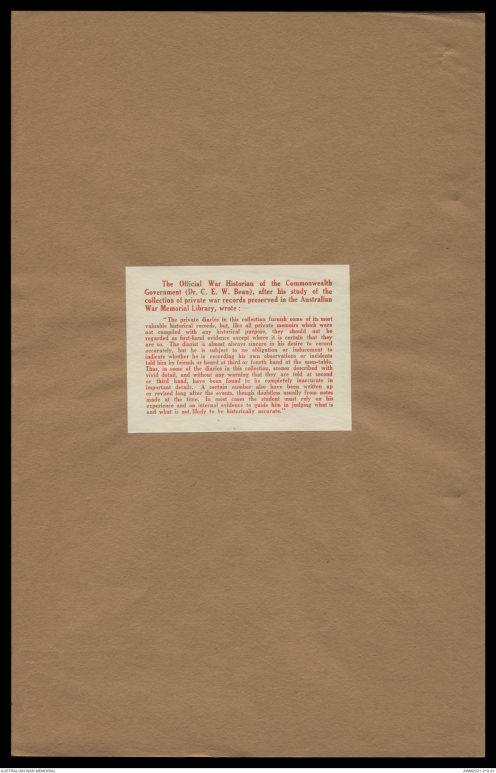
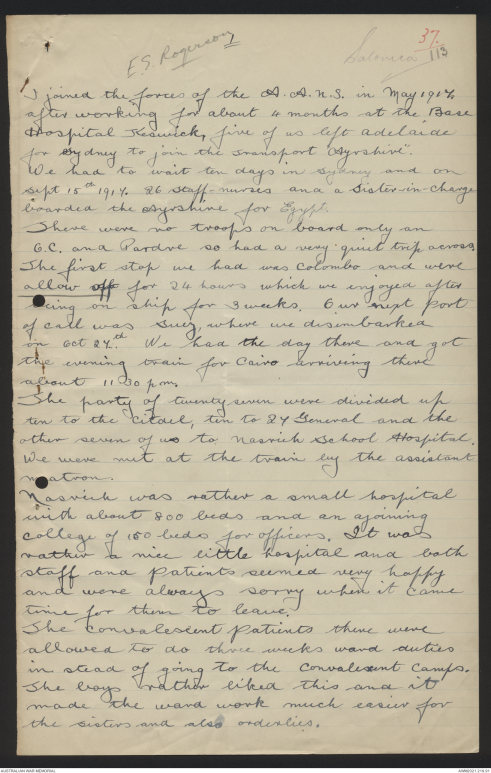
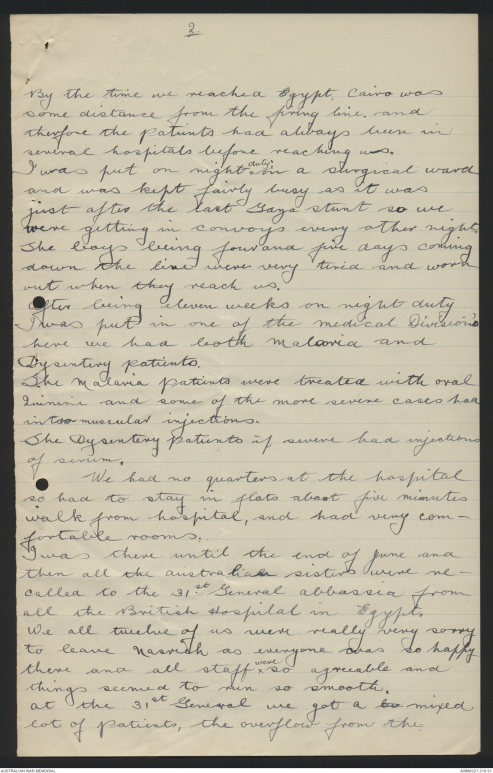
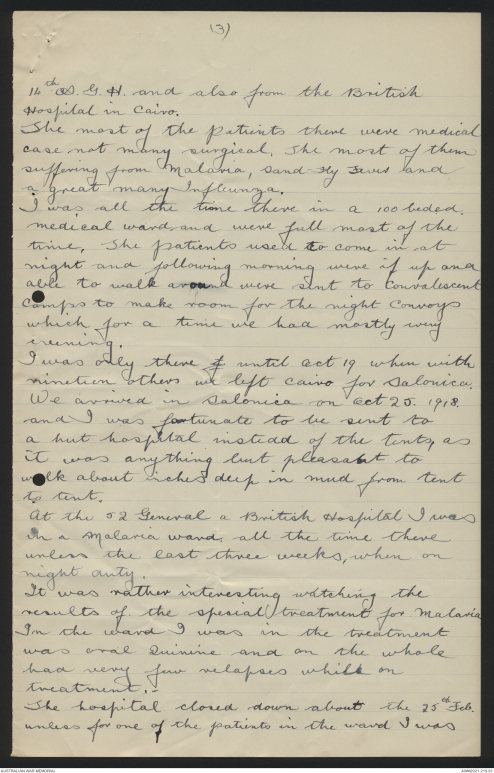
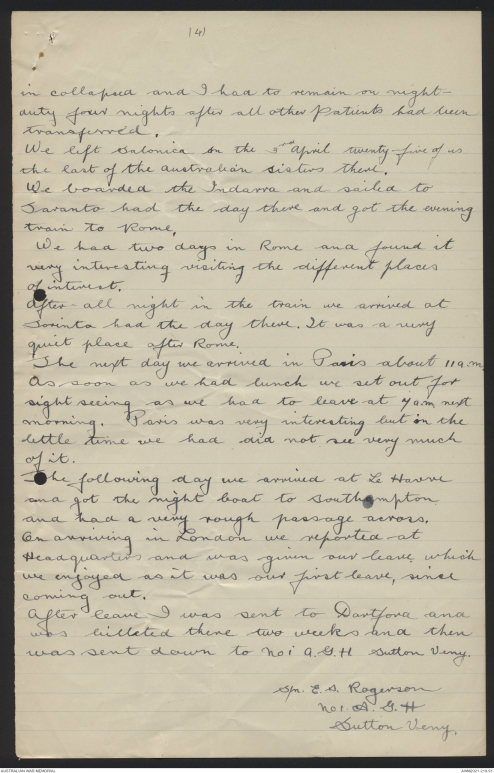
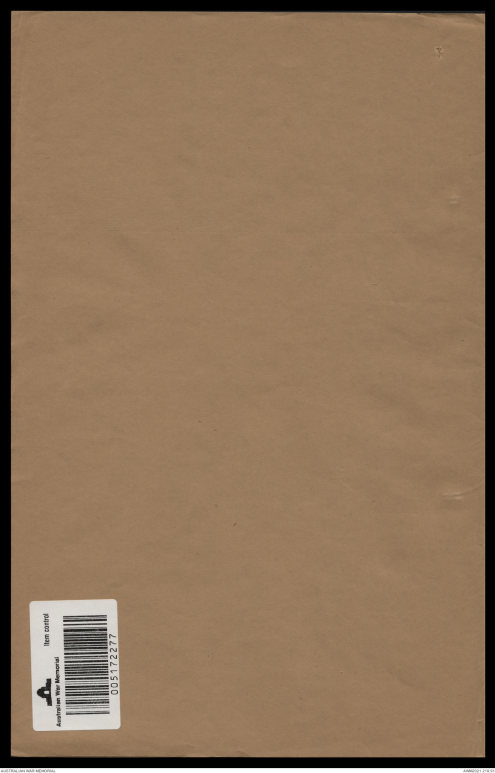
Butler Colln.
6/38
[6/19] AA
[[?]]
AWM 41
AUSTRALIAN ARCHIVES
ACCESS STATUS
OPEN
STAFF NURSE E. S. ROGERSON.
[1032]
The Official War Historian of the Commonwealth
Government (Dr. C. E. W. Bean), after his study of the
collection of private war records preserved in the Australian
War Memorial Library, wrote :
"The private diaries in this collection furnish some of its most
valuable historical records, but, like all private memoirs which were
not compiled with any historical purpose, they should not be
regarded as first-hand evidence except where it is certain that they
are so. The diarist is almost always sincere in his desire to record
accurately, but he is subject to no obligation or inducement to
indicate whether he is recording his own observations or incidents
told him by friends or heard as third or fourth hand at the mess-table.
Thus, in some of the diaries in this collection, scenes described with
vivid detail and without any warning that they are told at second
or third hand have been found to be completely inaccurate in
important details. A certain number also have been written up
or revised long after the events, though doubtless usually from notes
made at the time. In most cases the student must rely on his
experiences and on internal evidence to guide him in judging what is
and what is not likely to be historically accurate."
E.S. Rogerson 37/113
Salonica
I joined the forces of the A.A.N.S. in May 1917.
after working for about 4 months at the Base
Hospital Keswick, five of us left Adelaide
for Sydney to join the transport "Ayrshire".
We had to wait ten days in Sydney and on
Sept 15th 1917. 26 staff-nurses and a Sister-in-charge
boarded the Ayrshire for Egypt.
There were no troops on board only an
G.C. and Padre so had a very quiet trip across.
The first stop we had was Colombo and were
allow off for 24 hours which we enjoyed after
being on ship for 3 weeks. Our next Port
of call was Suez, where we disembarked
on Oct . We had the day there and got
the evening train for Cairo arriving there
about 11.30 p.m.
The party of twenty seven were divided up
ten to the Citadel, ten to 27 General and the
other seven of us to Nasrich School Hospital.
We were met at the train by the assistant
matron.
Nasrich was rather a small hospital
with about 800 beds and an ajoining
college of 150 beds for officers. It was
rather a nice little hospital and both
staff and patients seemed very happy
and were always sorry when it came
time for them to leave.
The convalescent patients there were
allowed to do three weeks ward duties
in stead of going to the convalescent camps.
The boys rather liked this and it
made the ward work much easier for
the sisters and also orderlies.
2.
By the time we reached Egypt, Cairo was
some distance from the firing line. and
therefore the patients had always been in
several hospitals before reaching us.
I was put on night duty in a surgical ward
and was kept fairly busy as it was
just after the last Gaza stunt so we
were getting in convoys every other night.
The boys being four and five days coming
down the line were very tired and worn
out when they reach us.
After being eleven weeks on night duty
I was put in one of the medical Division's
here we had both Malaria and
Dysentery patients.
The Malaria Patients were treated with oral
Quinine and some of the more severe cases had
intro-muscular injections.
The Dysentery Patients if severe had injections
of serum.
We had no quarters at the hospital
so had to stay in flats about five minutes
walk from hospital, and had very comfortable
rooms.
I was there until the end of June and
then all the Australian sisters were
recalled to the 31st General Abbassia from
all the British Hospital in Egypt.
We all twelve of us were really very sorry
to leave Nasrich as everyone was so happy
there and all staff were so agreeable and
things seemed to run so smooth.
At the 31st General we got a bi mixed
lot of patients, the overflow from the
(3)
14th A.G.H. and also from the British
Hospital in Cairo.
The most of the patients there were medical
case not many surgical. The most of them
suffering from Malaria, sand-fly fever and
a great many Influenza.
I was all the time there in a 100 beded
medical ward, and were full most of the
time. The patients used to come in at
night and following morning were if up and
able to walk around were sent to convalescent
camps to make room for the night convoys
which for a time we had mostly every
evening.
I was only there f until Oct 19 when with
nineteen others we left Cairo for Salonica.
We arrived in Salonica on Oct 25. 1918.
and I was fortunate to be sent to
a hut hospital instead of the tents, as
it was anything but pleasant to
walk about inches deep in mud from tent
to tent.
At the 52 General a British Hospital I was
in a Malaria ward, all the time there
unless the last three weeks, when on
night duty.
It was rather interesting watching the
results of the special treatment for Malaria.
In the ward I was in the treatment
was oral Quinine and on the whole
had very few relapses while on
treatment.
The hospital closed down about the 25th Feb.
unless for one of the patients in the ward I was
(4)
in collapsed and I had to remain on night
duty four nights after all the other Patients had been
transferred.
We left Salonica on the 5th April twenty-five of us
the last of the Australian sisters there.
We boarded the Indarra and sailed to
Taranto had the day there and got the evening
train to Rome.
We had two days in Rome and found it
very interesting visiting the different places
of interest.
After all night in the train we arrived at
Torinta had all day there. It was a very
quiet place after Rome.
The next day we arrived in Paris about 11 a.m.
As soon as we had lunch we set out for
sight seeing as we had to leave at 7 a.m. next
morning. Paris was very interesting but in the
little time we had did not see very much
of it.
The following day we arrived at Le Havre
and got the night boat to Southampton
and had a very rough passage across.
On arriving in London we reported at
Headquarters and was given our leave which
we enjoyed as it was our first leave, since
coming out.
After leave I was sent to Dartford and
was billeted there two weeks and then
was sent down to No i A.G.H. Sutton Veny.
S/n. E. S. Rogerson
No 1 A.G.H.
Sutton Veny.
 Sam scott
Sam scottThis transcription item is now locked to you for editing. To release the lock either Save your changes or Cancel.
This lock will be automatically released after 60 minutes of inactivity.